An avid rifle hunter switches teams, flinging arrows in the late season. Read about his steep learning curve and follow him on this adventure!
Last month, I shared a story about choosing a bow and getting it set up for a late December deer hunt in Idaho. If you missed it, take a peek here: This time, I’ll go over some important equipment/clothing to pack for a hunt in the high desert hills of the West.
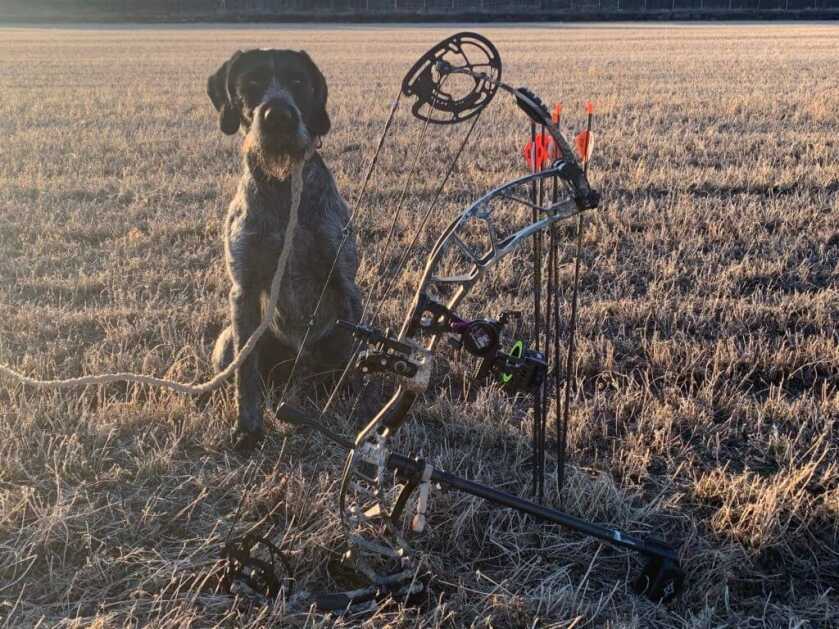
Logistics
Before I get too far into the items that one should have while hunting, I want to describe how exactly I will be going about this hunt. I’ve hunted off of horseback, four-wheelers, a pack and my feet, etc… each method is more or less a consequence of the environment where the game is. In December in Idaho, the snow is typically piled up in the high country which forces the deer down into the rolling hills of the high desert. This is good for us because the deer are more concentrated in one area, allowing the hunter to walk less and glass more in order to see the most deer. Typically, we drive to a high point on a ridge with a good vantage point and begin combing the hills around us with binoculars and spotting scopes. Once we find the targeted deer, the walking begins. Typically, these walks are under 1 mile long in one direction. If the stalk fails, it’s back to the home base – the truck. If needed, we repeat this spot and stalk process until success is found.
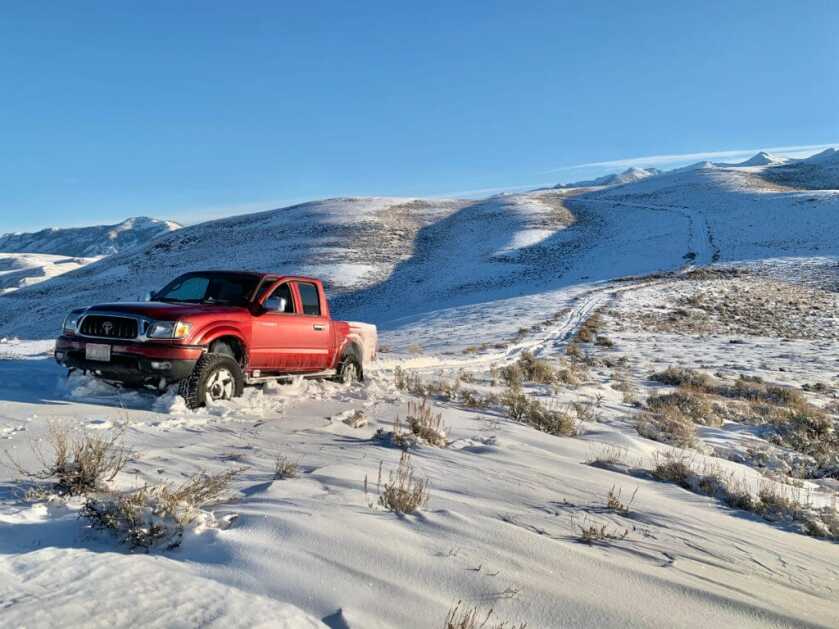
Equipment
There are a lot of cool gadgets that make life on the hill more pleasant. Some may even save a person’s life in certain scenarios. I like to limit the gear that I carry in my pack to the necessities while hauling around the quality of life improving items in the truck/wheeler. We’ll start off with the most important part of a western hunter’s kit: glass.
- Glass
Because of the wide open terrain, it is of utmost importance to be able to see a deer that is over a mile away with a pair of 10x binoculars. If you can afford it, this is an area that I would plan to spend a large portion of your budget on. I recently upgraded my spotting scope to a Meopta MeoStar S2 82 HD – angled spotting scope. This optic will be found for around $1,600 to $1,700 but is worth every penny. The ability to count points on a deer’s antlers at distances well over 2 miles away is a large advantage.
In an archery hunt, the only other commonly used glass is binoculars and a rangefinder. I used the same rangefinder for this hunt as I do on my rifle hunts – a Leupold RX-2800 TBR/W so it may have been a bit overkill, but the built-in trig function was a lifesaver. This rangefinder will give you the true horizontal distance as well as a line-of-sight distance. Those who have shot in the mountains know that severe inclines will change the holdovers that you use due to the introduced trigonometry that is involved and true horizontal distance is what we need for ballistics of any kind, whether its for throwing a rock, shooting a gun, or slinging an arrow.
The Binoculars that I used are currently the weakest link in my glass arsenal, and will be upgraded when I have the ability. But for the meantime Vortex’s Diamondback HD 10×42 binoculars get the job done and are quite affordable, coming in at an MSRP of $279.00 and can be found in store for around $200.00. I carry these binoculars on a Vortex Glasspak Binocular Harness so that I have quick access to them. I also keep my rangefinder and phone in this harness for the same convenience.
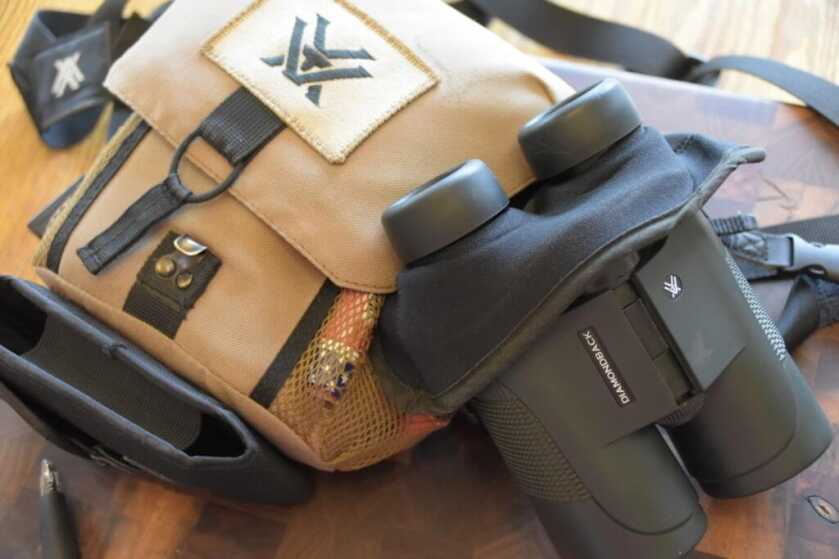
- Pack
Your pack is your lifeline in the woods. If you can’t carry it, you can’t carry almost anything that you put in it. It needs to be lightweight, waterproof, have some kind of frame, and be comfortable. I have been a long time fan of Eberlestock’s packs and still use them to date. On this hunt, I will be using either an X2 Pack, or a Mainframe with Batwing Pouches. Both systems are fantastic and I like to have options available for any number of situations. Whichever pack I don’t take with me will keep the remainder of my gear organized until I return.
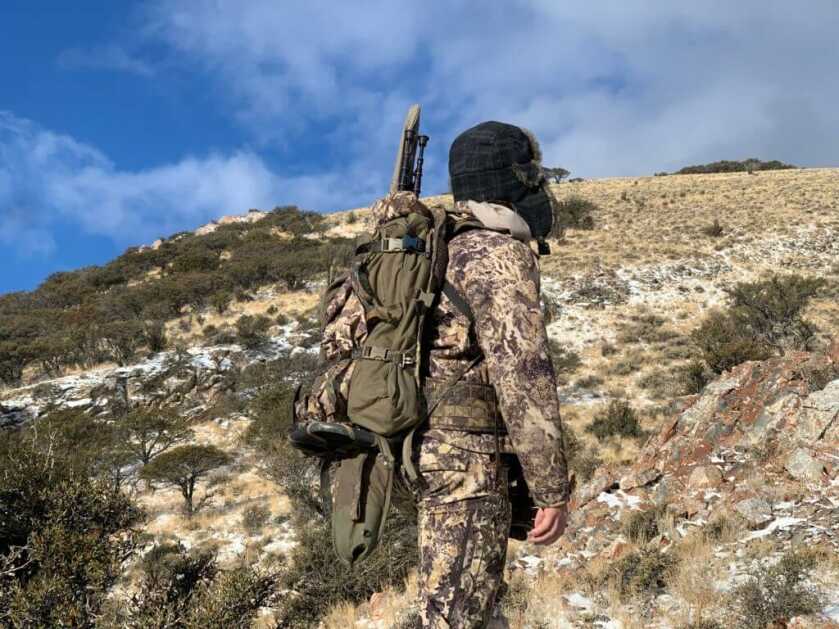
- knives
If I could only choose one knife to use through a hunting trip, I’d pick my Havalon Piranta-Edge. This knife is small, lightweight, and incredibly sharp with interchangeable razor blades.
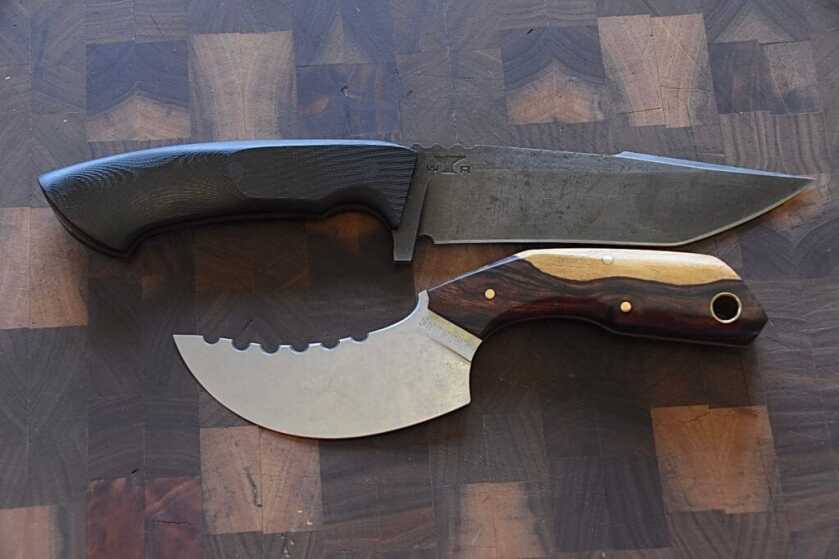
However, I do like to carry a dedicated skinning knife and a larger knife which I use for quartering and splitting the brisket on a deer in my extra pack. If I’m able to drag the deer off the mountain, a good quality, purpose built knife is my first choice to use. For these, I have a Wolf River Forge WR Fighter to do the heavy work and a Septem Knives Skinner for, well… skinning of course.
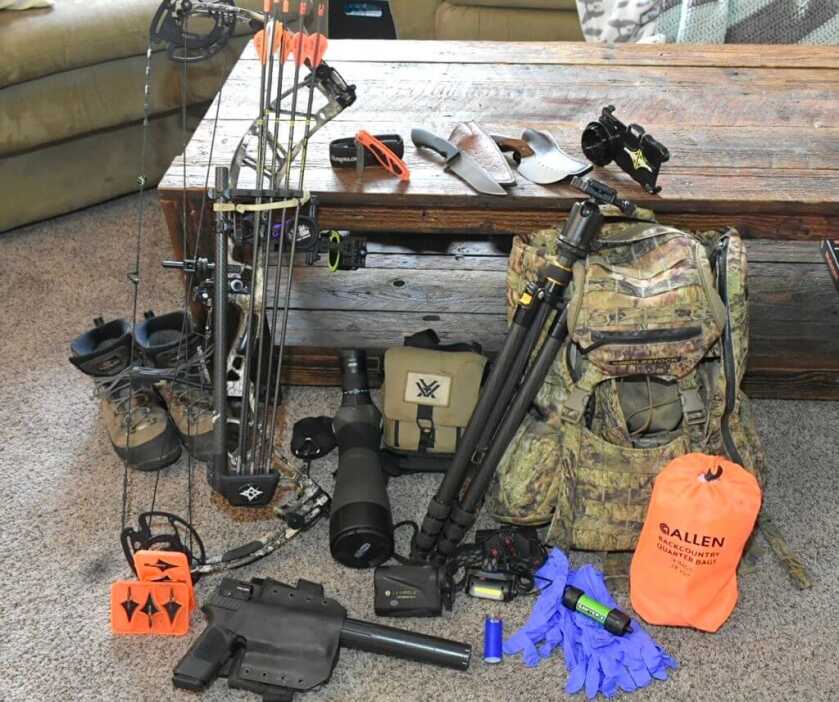
Miscellaneous Items
Item
type/brand
- Hunting license and tags…………………………………
- Tripod
- Game bags ………………………………………………..
- Headlamp
- Phone Skope spotting scope adapter
- Lighter or two
- Firestarter
- Sidearm
- Make sure it’s yours and for the hunt you want
- Neewer 66″ Carbon Fiber Tripod
- Allen Backcountry Quartering Bags (Large)
- Any will work. I buy cheap ones.
- Match to your phone type and objective size
- Again, any will work.
- Pyro Putty
- Suppressed Glock 19X
What to Wear
For clothing, you’ll want layers. When going for a hike in steep terrain, you’ll find that your body heats up quickly and will start to sweat, despite the cold. You want to avoid sweating because it will cool you down extremely fast once you pause your physical activity. Getting wet in any manner is something that you want to avoid, so naturally waterproof gear and a pair of gaiters to keep the snow out of your boot is another must.
- Coats
Again, Layers are extremely important so one hot coat is not going to be all you need. I brought a light, water resistant fleece-lined jacket, a waterproof coat with PrimaLoft insulation, a snow camo option, and a waterproof shell for extreme weather. Respectively, these jackets were Eberlestock’s Cache Peak Jacket, Lost River Jacket, a Kings Camo Weather Pro Insulated Jacket in Snow Shadow and a Gator Waders’ Shield 3 in 1 jacket. With these, I can mix and match to best fit the situation/weather.
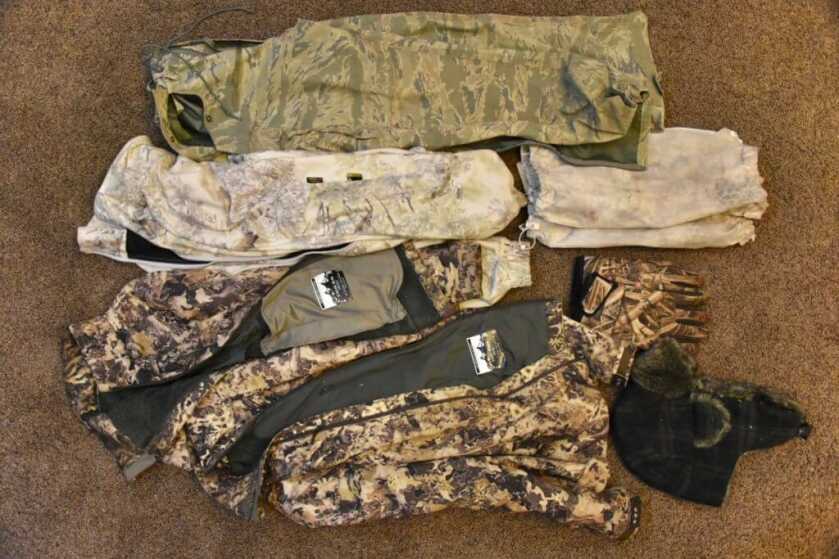
- Clothing
When hunting in the snow, your clothes will get wet. Either directly from the snow melting on your pant legs/shirt sleeves, or indirectly from sweating while walking in the hills. Because of this, I like to wear quick-drying synthetic clothing. Also, because I’m a bit strange, I like my camo to match more-or-less. For these reasons, Eberlestock clothing was my #1 choice again. The pant of choice is their Afterburner Pant. The shirt of choice is the Bruneau SPF Hoody. These are both quick-drying, lightweight, and breathable.
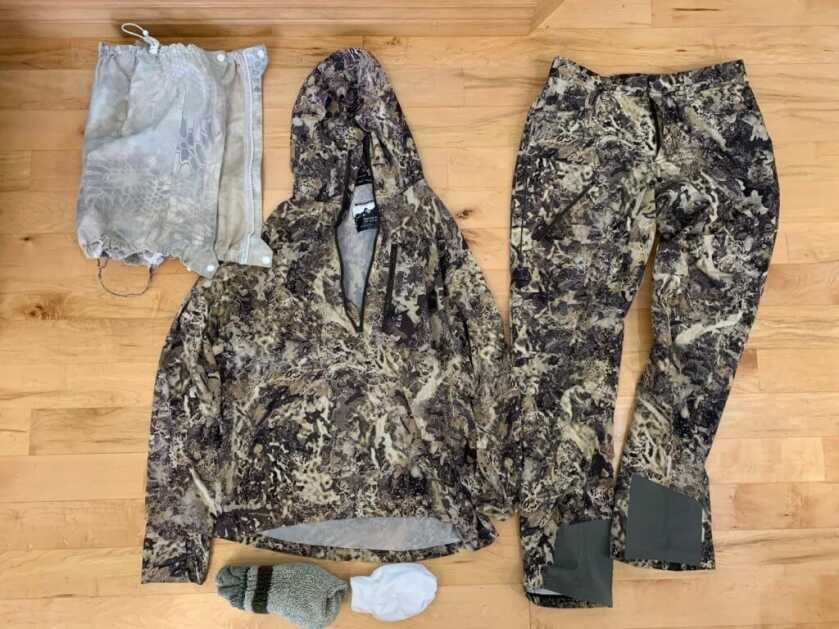
Some people also like to wear thermals (long underwear) under their clothing, but I’m not a fan of them. Thermals are great for keeping you warm when it’s bitter cold and you are holding still. For example, when you are in a treestand, on a snowmobile, in a duck blind, etc… However, the moment you begin to hike, they can turn out to be a little too warm. If you decide to wear them, just be aware of this.
- Footwear
The boots that I will wear on this deer hunt are Crispy Valdres Plus GTX. This has proven to be an extremely tough boot with great waterproof properties. It is very important that you wear waterproof boots on a hunt that you expect to be in the snow. Wet feet are not only cold but will sharply accelerate the blister forming process. Speaking of, make sure that you have worn the boots often leading up to your hunt so that they are broke in, and your feet are used to them. Failing to do this will also result in blisters.
The boots that I wore are not insulated, so I am making sure to wear warm, wool socks. If you go the wool route like I am, I suggest that you also wear a polyester blend liner sock. This will reduce friction in your boot and help your body regulate its temperature. This means no (or at least less) sweat!
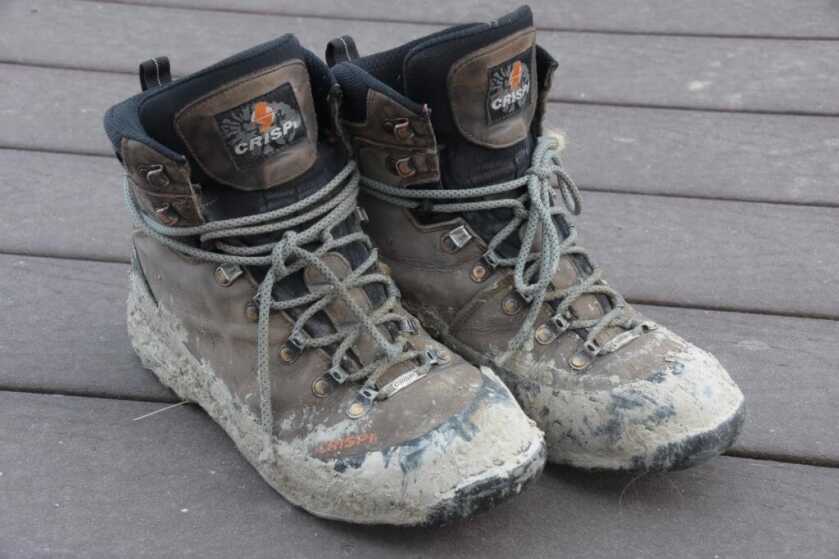
Other Items to Consider
- winter gloves
- warm hat
- gaiters
- scarf or neck gaiter
With all of my gear packed and ready to go, I am finally ready to get out and hunt some Idaho mule deer with my bow! Next time, read about the hunt in part 3 of 3!



Why the Glock? 2 legged varmints running wild? I hunt with a variety of weapons- birds and big game. Except for dedicated bear hunts I haven’t carried a sidearm in almost 30 years.
That’s very impressive. Where I hunt it wouldn’t surprise me to run into a pack of wolves, a hungry cougar, or a rock that needs to be blasted during a dull moment. You really gotta watch out for the suburban cougars, they are the most vicious 😉